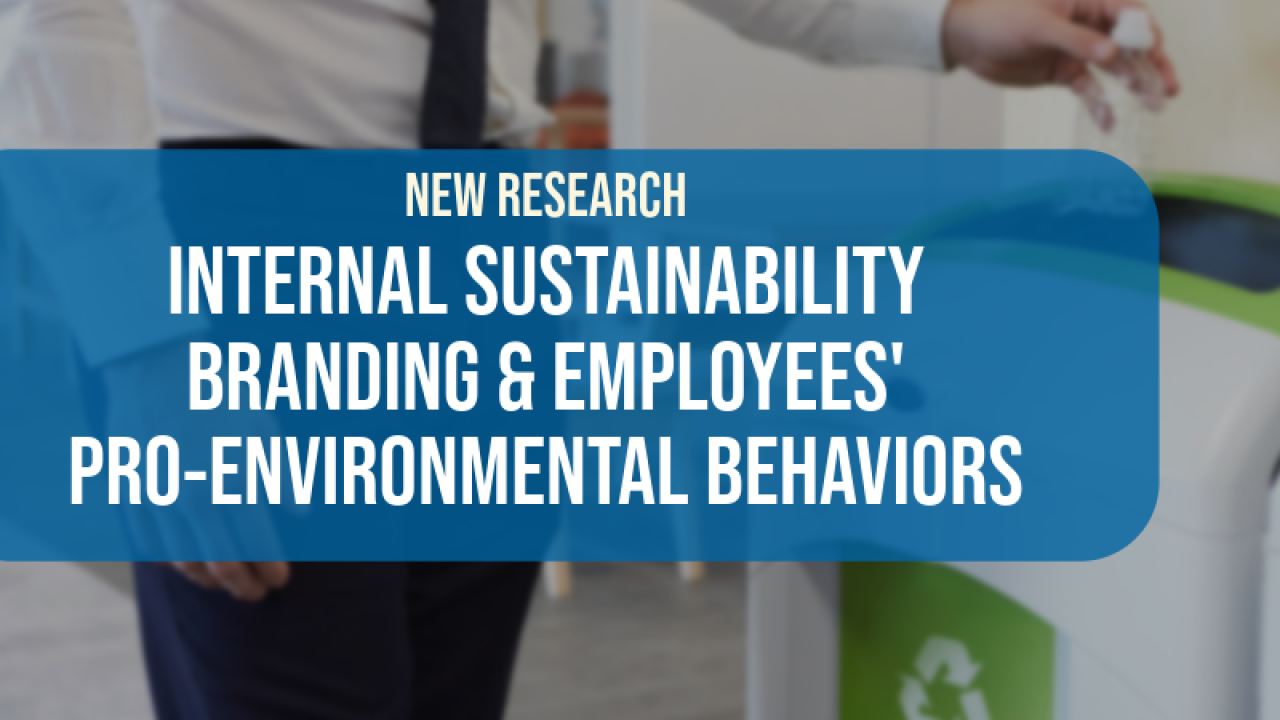January 23, 2024
Internal sustainability branding and employees’ pro-environmental behaviors

By Yeunjae Lee, Colorado State University, Ruoyu Sun, University of Georgia, and Enzhu Dong, University of Miami
Employes’ pro-environmental behaviors have become essential organizational assets for today’s corporations fulfilling their environmental sustainability commitments to society. The COVID-19 pandemic even emphasized its importance as amplified environmental issues (e.g., the increased water usage and waste generation) propelled companies to embrace eco-friendly practices.
In general, employees’ pro-environmental behaviors (or green behavior) can be categorized into two dimensions: task-related (in-role) and proactive (extra-role) green behaviors. Task-related behavior entails employees engaging in green practices as part of their job duties, while proactive behavior involves self-initiated actions that go beyond mandated work tasks. Recognizing the pivotal role of strategic communication in corporate management involving employees, our research specifically centers on internal sustainability branding to explore its influence on employees’ green behavior in the workplace.
Internal sustainability branding, comprised of internal communication, rewards/compensation, and orientation/training, pertains to a company’s endeavors to convey a clear idea about its branding efforts on sustainability to employees, aimed at enhancing their understanding and knowledge of the role they play in delivering the brand promise and value of environmental initiatives. It serves as the primary source for employees to comprehend and internalize the company’s efforts related to environmental sustainability and engage in pro-environmental behaviors.
Our results from two surveys with employees in the United States in multiple industries suggested that internal sustainability branding helps employees to recognize the significance of companies addressing environmental issues, fosters their emotional connections to environmental sustainability, and reduces their constraints on taking actions to support their employer’s sustainability efforts. As a result, employees are motivated to adopt green behaviors at work following their employer’s guidance and further, support environmental initiatives in a proactive and voluntary manner.
Additionally, internal sustainability branding enhances a favorable employee-organization relationship and employees’ role as ambassadors and contributors of their employer’s sustainability initiatives, thereby increasing employees’ pro-environmental behaviors at work.
We believe this study marks an initial advancement in theorizing sustainability. communication within internal public relations through an integrative model, demonstrating the significance of internal sustainability branding in motivating employee green behaviors. The findings empower the fields of internal communication and public relations to become instrumental in fostering sustainable and environmental change.
Our research suggests that companies may consider prioritizing internal sustainability branding as a critical communication intervention strategy by transmitting brand values and efforts in sustainability to help employees fully grasp their role. This effort should not be limited to providing training programs and rewards/compensation but include communicating clear vision and value and listening to employees’ feedback and ideas to incorporate them.
Such branding communication efforts can motivate employees into corporate citizens who actively support and contribute to the company’s environmental endeavors through active pro-environmental behaviors.
For further information on this research, please email Lee at yeunjae.lee@colostate.edu. This project is supported by the 2021 Page/Johnson Legacy Scholar Grant on corporate social advocacy.
